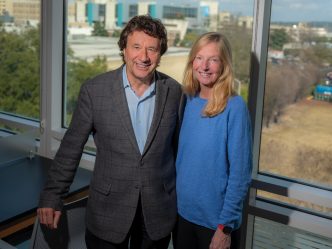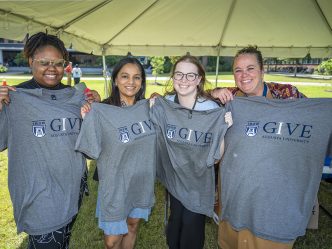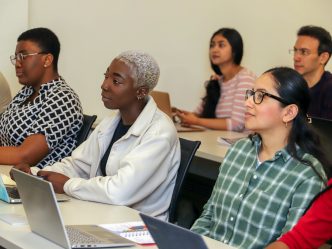From discovering potential cures for cancer to developing a vaccine for the Zika virus, the biomedical sciences are at the forefront of medical innovation.
Augusta University’s Biomedical Sciences PhD Program equips students with the resources needed to become independent biomedical researchers and further prepares them to become leaders in their given fields.
With nine programs of study, ranging from genomic medicine and neuroscience to oral biology, Augusta offers students one of the most varied biomedical science graduate degree programs in the state.
As the home to Georgia’s only public academic medical center, though, Augusta also offers something no other public university in the state can boast — something Dr. Mitchell Watsky, dean of The Graduate School, says makes all the difference in terms of choosing the right degree program.
“As the only public university in Georgia with a medical center, our students have the opportunity to really integrate into the medical sciences,” Watsky said. “In addition, many of the laboratories our students work in collaborate with our physicians, giving them a chance to get a hands-on, translational perspective on the work they’re doing.”
That distinction, he said, attracts a different class of student.
“These are going to be students who are very intelligent, very driven, people who are passionate about what they’re doing,” he said. “They’re patient, and they’re in it for the long haul. They also understand that they’ll have to communicate, and communicate effectively, in the workplace.”
Learning to hone those communication skills is important, especially in an increasingly diverse workplace.
Thankfully, with an average time-to-degree period of around five years, students will have the opportunity to learn and perform research under the guidance and supervision of some of the world’s most talented researchers and communicators.
“The two colleges primarily involved in the biomedical sciences research program are the Medical College of Georgia and The Dental College of Georgia, and the faculty from those colleges are all world-class researchers,” Watsky said. “Their collaborations with researchers locally, nationally and internationally allow students a chance to build a very diverse research portfolio.”
The key to the program’s success, as is the case with most great research, is its dedication to focus.
Students begin their first year with a multidisciplinary core curriculum, designed to provide a broad-based foundation of knowledge and cultivate the critical thinking skills students will need for a successful career as an independent researcher. The curriculum, which includes laboratory rotations, fully prepares students to choose both a discipline and a research mentor by the end of their first year.
Along the way, students learn to identify important questions, conduct and analyze scientific research, give seminars, publish research papers and write grants from professionals in their chosen field.
As students progress, they eventually focus on and complete a doctoral dissertation based on their own original research. Many go on to present their research at local, national and international meetings. The Graduate School offers travel funding to help the students attend many of these meeting.
In addition to working alongside some of the world’s best researchers, students accepted into the Biomedical Sciences PhD Program are also considered on an annual basis for a graduate research assistantship appointment. The 2015-16 GRA package includes stipend support of up to $25,000, a reduced tuition rate and payment of the health insurance premium for enrollment in the standard Augusta University student health insurance program.
The GRA is part of the university’s ongoing commitment to rewarding exceptional researchers both for their determination and their dedication. And, in the Biomedical Sciences PhD Program, that’s a commitment with a great deal of history.
The program’s first biochemistry PhD was awarded nearly 50 years ago by the Medical College of Georgia to the late Dr. Jasper Lewis, a former professor of research in the college’s Department of Medicine.
Since then, the program has succeeded in awarding degrees to hundreds of the world’s leading scientists, researchers, physicians, and educators.
That mission, Watsky said, continues with renewed purpose with each and every new class.
“These students are our future scientists, the future of biomedical research,” he said. “The fact that we have world-class researchers mentoring students looking for a world-class education is the perfect combination.”
 Augusta University
Augusta University



